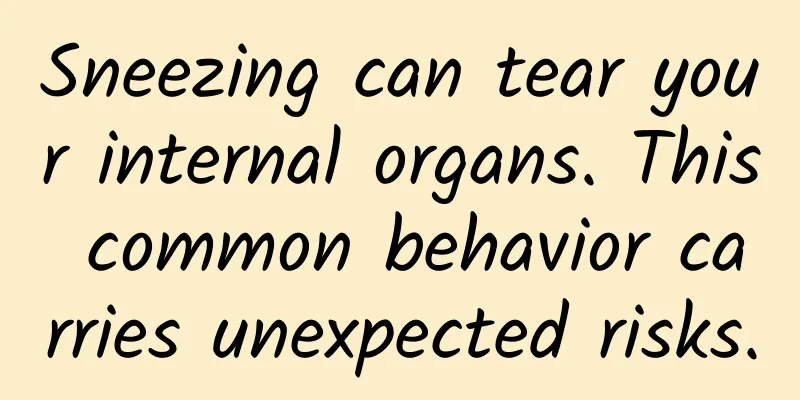Sneezing can tear your internal organs. This common behavior carries unexpected risks.

|
It's hard to imagine that a common sneeze can almost kill someone, but this is what happened. According to a paper in the American Journal of Medical Case Reports, a man in Florida, USA, had recently undergone abdominal surgery, and the surgical scar had not yet fully healed. As a result, while eating breakfast, he couldn't help sneezing, and then he started coughing, and then he felt a warm sensation accompanied by abdominal pain spreading throughout his body - the twisted intestines gushed out from the ruptured wound. Fortunately, he was rushed to the hospital for emergency intestinal reduction surgery, which saved his life. Written by | Luffy If you were asked to guess what kind of accident could cause a person's internal organs to "explode", you would probably first think of puncture wounds caused by car accidents, because you would never imagine that a common behavior like "sneezing" could have terrible consequences. Why do people sneeze? Sneezing is usually a protective reflex that prevents potentially harmful substances, such as dust, bacteria and viruses, from entering the respiratory system. This process is controlled by the so-called "sneeze center" in the brain medulla. When the body inhales air, the receptors in the nasal cavity are stimulated and transmit signals to the trigeminal ganglion. The signal is transmitted to the sneeze center in the brainstem via the trigeminal nerve, which further activates the respiratory center to respond. A sneeze is produced by the rapid closing of the glottis after a deep breath, followed by the rapid expulsion of air through the nose and mouth. When you sneeze, your chest muscles contract and your eyes, throat and mouth close - compressing the lung tissue to force air out of the respiratory system, which triggers an impressive reaction - a sneeze. According to the Guinness Book of World Records, the highest airflow speed caused by a sneeze is currently 167 kilometers per hour (about 46 meters per second). Sneezing tears your internal organs Figure 1: Lung Herniation Although sneezing is effective in clearing pathogens, dust, and other irritants from your nasal passages and protecting your respiratory system from harm, it also has the potential to tear your internal organs apart. For people with impaired respiratory systems due to morbid obesity, chronic obstructive pulmonary disease, diabetes or long-term smoking, a violent sneeze can cause a sudden increase in abdominal pressure and cause the lungs to protrude from the intercostal space, causing a lung herniation. Even worse, a sneeze can directly tear the fragile lung tissue when high-pressure air deep in the lungs escapes into the space between the chest and the lungs, compressing the lungs on one or both sides of the chest. In addition to the lungs, sneezing can also tear the delicate brain, causing subarachnoid hemorrhage, which can be fatal if not diagnosed and treated promptly. Even if the membrane is not torn, sneezing can still affect the brain - there have been reports of people becoming weak or having vision problems after sneezing. In addition, sneezing can cause blood pressure to soar, causing other serious damage to blood vessels. Even some violent sneezes can tear the aorta and cause blood vessels to rupture. If not treated in time, the mortality rate within 48 hours after the onset of the disease is as high as 50%. Even more bizarre is that, in addition to causing musculoskeletal injuries in the back, sneezing can also cause bone fractures around the eyes. While these blowout fractures are usually caused by blunt force trauma—like a golf, tennis, or baseball—a simple sneeze can have the same consequences. In addition to the eyes, the ears are also not spared. During a sneeze, due to the strong airflow and pressure changes, the ossicles in the middle ear may be subjected to external force impact. In some cases, this impact may cause the ossicles to dislocate or fracture, which in turn affects their normal sound transmission function, resulting in hearing loss. For people with weak pelvic floor muscles, such as those who have given birth, are obese, menopausal, and have physical trauma or nerve damage, the high pressure in the abdominal cavity caused by sneezing can cause urine to be forced out of the bladder, resulting in urine leakage. If you have dental implants, a sneeze could knock your teeth off, and you'd be left searching for them all over the floor. Can you hold back a sneeze? Since sneezing can cause so much potential harm, a smart person like you would definitely think: why not just hold it in - but the fact is, it is difficult to hold it in, and once you sneeze with your mouth and nose closed, the consequences may be more serious. In 2023, a Scottish man sneezed with his mouth and nose closed, which caused the pressure from the sneeze to accumulate in his respiratory system - sometimes up to 20 times the normal pressure. This energy had to find an outlet, resulting in spontaneous tracheal perforation. Don't worry, though, sneezing can't cause this kind of damage. When you sneeze with your eyes open (if you can do it), don't worry about your eyeball popping out, because your eyeball is held in place by the medial and lateral rectus muscles, superior and inferior rectus muscles, oblique muscles, and nerve tissue. Not to mention, there's no connection between the human airway and the eye socket. Finally, I want to tell you that the human body is incredibly subtle. Our bodies can control sneezes freely. You don’t need to worry about getting hurt from a normal sneeze, because many of the above-mentioned injuries only occur in very rare circumstances. However, if you are like Donna Griffiths (according to the Guinness Book of World Records, this British woman started sneezing on July 26, 1981, and it was unstoppable until she finally experienced her first sneeze-free day on September 16, 1983, after millions of sneezes), then you may want to be careful because you are at greater risk of injury! Special Tips 1. Go to the "Featured Column" at the bottom of the menu of the "Fanpu" WeChat public account to read a series of popular science articles on different topics. 2. Fanpu provides a function to search articles by month. Follow the official account and reply with the four-digit year + month, such as "1903", to get the article index for March 2019, and so on. Copyright statement: Personal forwarding is welcome. Any form of media or organization is not allowed to reprint or excerpt without authorization. For reprint authorization, please contact the backstage of the "Fanpu" WeChat public account. |
Recommend
What features should a landing page that sells well during the 618 shopping festival have?
Tmall’s transaction volume on Double Eleven reach...
Warner Bros. cancels the cinema window period. The worst sufferers are not the cinemas, but the actors who want to get ahead.
After holding on for a year, the American film st...
Disliked by animals, it is the "nemesis" of sand
In the winter in the north, seeing some green is ...
On Humanity’s Lunar Day, how to protect the lunar heritage?
In order to take a photo of the banner on the lun...
The iPhone 6 Plus may have 2GB of RAM
It is not an exaggeration to describe the two new...
How to become a data analyst in seven weeks: Data visualization and building BI step by step
The report that data analysts use more often is B...
Useful information collection | 4 principles to help you effectively improve the "communication ability" of copywriting
Copywriting is a job with a relatively low entry ...
A Raspberry Pi with Windows 10 is still $35
Raspberry Pi, which "sticks to the $35 price...
From 0 to 1, how to carry out overseas operations and promotion?
Establish a promotion and operation system around...
How much is one gram of Cordyceps sinensis in Nagqu, Tibet in 2020
Cordyceps sinensis has been a very nourishing med...
How should an interactive landing page be designed? Teach you some tricks!
September and October are the peak decoration sea...
How to optimize article titles and how to write website articles to get rankings?
Why do other people's article page titles ran...
Where can I find materials for information flow delivery? I will share all my private channels with you!
As the saying goes, if you want to do your work w...
Is the decline inevitable? With less than 1% market share, what happened to Microsoft WP?
[[144309]] In the PC world, Microsoft is undoubte...
I've been having itchy rashes lately, and it's annoying to scratch them! Huaxi doctors suggest you check this out...
Some people go out to enjoy the breeze or take a ...









